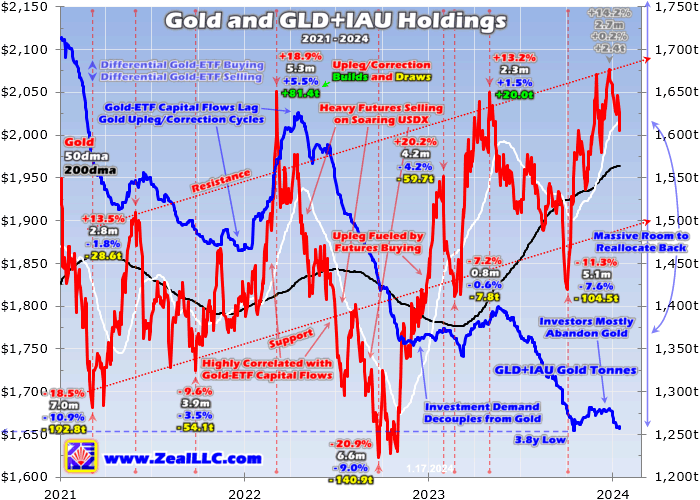Gold investment dead?

Gold’s latest record-achieving upleg continues grinding higher on balance. But gold’s strong technicals have yet to attract back investors, identifiable gold investment demand looks dead. Little capital has been allocated to ride this upleg, which is quite unusual. But this serious disconnect won’t last, eventually gold will power high enough for long enough to reappear on investors’ radars. Then they will rush back in to chase it.
Gold was whacked this week, suffering back-to-back 1.0% down days. Tuesday’s loss followed a Fed governor talking hawkish about keeping rates higher for longer in 2024. Wednesday’s arose after US retail sales came in stronger than expected in December, lowering Fed-rate-cut odds. Both spawned US-dollar buying which triggered sizable-to-large gold-futures selling, slamming gold back down around $2,006.
That sharper gold pullback did a number on sentiment, leaving flaring bearishness in its wake. But as always in markets, daily volatility must be considered within broader context. Gold remains strong, with very-bullish technicals. Its latest upleg born in early October has already surged 14.2% higher at best over 2.7 months into late December. That run achieved gold’s first new nominal record highs in several years!
Near $2,006 mid-week, gold’s total pullback off its latest record merely extended to 3.4%. Gold was right around its 50-day moving average, which often acts as support in ongoing uplegs. And gold is faring well against the benchmark US Dollar Index, which drives gold-futures trading. At 103.4, the USDX had bounced back up to pre-December-FOMC-meeting levels. The last time it was that high, gold was under $1,980.
While speculators are paying attention, investors don’t seem to care. The global gold investment market is fairly opaque, with definitive supply-and-demand data only published once a quarter by the World Gold Council. Its excellent quarterly Gold Demand Trends reports are highly-anticipated, offering the best-available read on world gold fundamentals. The new Q4’23 one will likely be published as February dawns.
While gold’s current upleg was born in early Q4, the previous Q3 GDT offers some insights into how gold investment demand is likely faring. That isn’t gold’s largest demand category, but its wild volatility often drives gold price trends. In 2023’s first three quarters, global gold investment demand according to the WGC totaled 686.9 metric tons. That plunged a sharp 20.6% year-over-year from the comparable 2022 span!
Gold investment demand is divided into two subcategories, traditional physical bars and coins and gold exchange-traded funds. The former was flat, only slipping 1.1% or 10.0t in the first 3/4ths of last year. But gold-bullion demand from physically-backed ETFs collapsed from -20.3t in 2022’s first few quarters to -189.0t in 2023’s! That accounted for 168.7t or 94% of gold’s year-to-date investment-demand plunge!
Since gold ETFs have proven such a dominant force driving gold prices over the last decade-plus, those quarterly GDT reports also track the world’s biggest physically-backed ETFs. Two American behemoths have always topped that list, the GLD SPDR Gold Shares and IAU iShares Gold Trust ETFs. At the end of Q3, together they commanded over 39% of all the gold held by all the world’s physically-backed ETFs!
The next-biggest competitor is a UK gold ETF merely weighing in at 7%. So GLD and IAU remain the biggest chunk of global gold-ETF capital flows by far. During 2023’s first three quarters when global ETF demand was actually 168.7t of supply, the 80.9t GLD+IAU-holdings draw accounted for nearly half of that! There have been plenty of quarters in recent years where GLD+IAU alone represented almost all of ETF flows.
These mighty gold ETFs play increasingly-important roles in the world gold market, acting as conduits for the vast pools of American stock investors’ capital to slosh into and out of physical gold bullion. GLD+IAU holdings reveal those capital flows, and are reported daily offering a high-resolution proxy for global gold investment demand. These ETFs’ managers have to buy and sell gold to maintain their shares’ price tracking.
When GLD+IAU shares are being bid higher faster than gold, ETF prices will soon decouple from gold’s to the upside. To avert failing their tracking mission, ETF managers offset that excess share demand by issuing sufficient new gold-ETF shares. The proceeds from these sales are then immediately plowed into physical gold bullion. So when GLD+IAU holdings are rising, American stock investors are buying gold.
That hasn’t happened at scale for a couple years now. This chart superimposes GLD+IAU holdings in metric tons over gold prices and key technicals. While gold has powered dramatically higher since mid-2022’s anomalous selloff driven by an extreme USDX surge on monster Fed rate hikes, its identifiable investment demand has collapsed! Investors have mostly abandoned gold, not returning after that brutal rout.

Normally GLD+IAU holdings have proven highly correlated with gold, which is logical. When gold uplegs are powering higher, investors grow excited and start reallocating capital to gold-ETF shares to chase gold’s gains. That was the case in gold’s last normal upleg, where it surged 18.9% over 5.3 months into early March 2022. GLD+IAU holdings saw a 5.5% or 81.4t build in that span as investors returned to ride gold.
While investment demand follows gold price trends, its turning points lag gold’s. Peak greed arrives as uplegs top, leading investors to keep buying even after gold reverses. But eventually gold falls far enough to convince them it has rolled over. Then they start selling as gold drops, persisting after its corrections bottom in maximum fear. New gold uplegs have to rally for some time before investors start to believe.
So investment demand normally amplifies both gold’s gains in uplegs and losses in corrections, leaving them bigger than they’d otherwise grow. That was sure the case in mid-2022, when gold plunged 20.9% in 6.6 months! The USDX which hyper-leveraged gold-futures speculators look to for their primary trading cues skyrocketed an astounding 16.7% in roughly that same span hitting an extreme 20.4-year secular high!
Peak dollar euphoria came as the Fed executed four monster 75-basis-point rate hikes in a row, part of its most-extreme tightening cycle ever. Gold’s serious drop despite inflation still raging out of control utterly crushed sentiment. If gold couldn’t climb with the hottest headline CPI inflation witnessed since the early 1980s, investors figured it had to be hopelessly broken. So they capitulated and abandoned gold in droves.
GLD+IAU holdings plunged 9.0% or 140.9t within that technical gold bear’s exact span. But their total draw was far worse from their own lagging peak to trough, a massive 16.7% or 271.3t! Investors, at least American stock ones who traffic in GLD and IAU shares, wanted nothing to do with gold. Its classic role as the ultimate inflation hedge and portfolio diversifier was in serious doubt thanks to that crazy USDX moonshot.
But as I analyzed at the time, the resulting massive gold-futures selling was way overdone so that super-anomalous dollar/gold shock was ending. The way-overbought USDX and way-oversold gold were both due for huge mean reversions, which were inevitable as the FOMC was running out of room to continue aggressively hiking. Over the next 4.2 months, gold blasted 20.2% higher reentering formal bull territory.
Even with their slow recognition of major gold reversals, normally investors would’ve started piling on as gold powered higher. GLD+IAU holdings did bottom and start grinding higher, but at a fraction of their usual pace given gold’s strong upleg. So incredibly during that mean-reversion new-gold-bull span, these mighty American gold ETFs actually shed 4.2% or 59.7t of physical bullion! Investors were still mostly fleeing.
Gold sentiment remained seriously damaged from mid-2022’s plunge, plagued by festering bearishness. Gold suffered a sharp pullback after that initial mean-reversion rebound, hammering GLD+IAU holdings to another new low. But as gold roared back, investors’ psychology finally started thawing. As gold blasted up 13.2% over 2.3 months, GLD+IAU holdings climbed a modest 1.5% or 20.0t. So things were improving.
Overall between late September 2022 to early May 2023, gold’s full mean-reversion upleg clocked in at excellent 26.3% gains over 7.2 months. Yet stunningly GLD+IAU holdings actually still fell 3.3% or 47.5t in that bullish span! It wasn’t just lingering bearishness from mid-2022, another big factor stole limelight from gold. Mid-2023 was when US stock markets’ artificial-intelligence bubble ballooned generating big euphoria.
Gold was crushing the S&P 500 into early May last year, up 12.4% YTD compared to just 5.8%! But as the wonders of ChatGPT captured investors’ imaginations, the SPX soared into late July led by mega-cap-tech stocks building the AI revolution. So the SPX blasted up another 13.0% from early May to late July, while gold drooped 4.1%. That left them up 19.5% and 7.8% YTD respectively, gold was way overshadowed.
Gold has long been an alternative investment, its own asset class only winning a small fraction of overall portfolio allocations. Alternatives thrive when investors remember the wisdom of prudently diversifying. That is forgotten when surging stock markets generate widespread greed. Investors assume stocks will keep rallying indefinitely, so they ignore diversification. Gold often languishes when the S&P 500 is really high.
So as a healthy gold pullback last summer cascaded into a violent breakdown into correction territory, American stock investors again fled GLD and IAU shares. When they are sold faster than gold itself, their prices threaten to decouple to the downside. To prevent gold-ETF shares from failing their tracking mission, their managers buy back shares to sop up excess supply. Necessary funds are raised by selling gold bullion.
As gold ground lower then briefly plunged into early October, its correction losses shot up to 11.3% over 5.1 months. Unbelievably during that span, American stock investors abandoning gold forced a major 7.6% or 104.5t GLD+IAU holdings draw. That actually rivaled mid-2022’s when gold plunged nearly twice as far! That pounded these globally-dominant gold ETFs’ holdings back to a deep 3.8-year secular low.
And gold’s latest upleg surging 14.2% at best since then and achieving two new nominal record highs hasn’t enticed investors back. GLD+IAU holdings merely edged up 0.2% or 2.4t in those 2.7 months. Then further forsaking gold, investors slammed GLD+IAU holdings right back near that major low just this week! The gaping disconnect between gold and its identifiable investment demand has been shocking.
With gold just off nominal record highs yet GLD+IAU holdings threatening new secular lows, it’s sure valid to wonder whether gold investment is dead. Have investors deserted gold forever? Is it now at the mercy of gold-futures speculators alone? It was their massive mean-reversion buying that fueled most of gold’s gains since late September 2022 with investors missing in action. Their selling retarded gold’s advance.
Two big market factors argue investors will soon return to gold, reestablishing normal relationships. The still-high USDX that ravaged gold in mid-2022 is rolling over into what will probably prove a major bear market. The FOMC has all but officially ended its scorching hiking cycle, with markets increasingly looking for rate cuts this year. Just as higher rates were bullish for the dollar, lower ones are bearish for it.
The lower the USDX grinds as Fed rate cuts are anticipated then executed later this year, the more gold-futures buying that will trigger pushing gold higher. And today’s young gold upleg growing will yield many new nominal record highs. The last one was late December’s $2,077, which is merely 3.6% higher than gold’s depressed midweek levels! Streaks of new record highs excite and attract investors like nothing else.
Back in early December after gold’s first record close in 3.3 years, I wrote a whole essay analyzing this powerful gold-record-momentum dynamic. Most investors forget about gold most of the time, but when new records are achieved bullish gold coverage in the financial media explodes. That restores investors’ awareness, catapulting gold back onto their radars. So they start reallocating capital to chase those gains.
This creates potent virtuous circles of buying. The higher gold rallies, the more new records are hit. Those drive increasing and more-bullish gold reporting by the financial media. That alerts investors to gold’s mounting upleg, so they increasingly buy in to ride it amplifying gold’s gains. The last time this happened was back in mid-2020, investment buying fueling a monster gold upleg seeing a few-dozen new records.
Those excited American stock investors so much that they rushed in with reckless abandon, catapulting GLD+IAU holdings a gargantuan 35.3% or 460.5t higher in just 4.6 months! The resulting gold upleg rocketed up an enormous 40.0% on that! When investment buying amplifying gold’s gains becomes self-feeding, gold soars dramatically. That should happen again in today’s upleg as investors soon return.
Likely adding to gold investment demand, the lofty US stock markets are overdue for a major selloff. They are seriously overbought, with the S&P 500 stretching as high as 10.3% above its baseline 200-day moving average in late December! That left this leading US-stock benchmark within just 0.3% of its all-time peak in early January 2022. The S&P 500 revisited those levels challenging a breakout last week.
Such high stock prices aren’t fundamentally-righteous though. Exiting December, the S&P 500’s elite component stocks averaged dangerous 30.3x trailing-twelve-month price-to-earnings ratios which are formally in bubble territory. The beloved Magnificent Seven mega-cap-tech stocks driving nearly all of last year’s big 24.2% S&P 500 gains were averaging crazy-high 50.5x TTM P/Es! A reckoning is inevitable.
When that overdue stock-market selloff hits and snowballs, investors will finally remember how smart it is to prudently diversify their stock-heavy portfolios. Some will look to gold, helped by its mounting bullish coverage in the financial media. And investors have massive mean-reversion gold buying to do to reestablish normal positions. GLD+IAU holdings slumped to just 1,256.5t midweek, just over deep secular lows.
That’s a colossal 544.0t under their all-time high of 1,800.5t achieved in the usual lagging fashion in mid-October 2020 after gold’s last record-achieving upleg peaked! And gold was only trading at $1,900 then, well under current levels. So gold investment isn’t only not dead, investors have lots of room to force GLD+IAU to buy hundreds of metric tons of gold bullion! That would supercharge this gold upleg like in mid-2020.
The biggest beneficiaries of much-higher prevailing gold prices as that investment disconnect is unwound will be the gold miners’ stocks. The GDX majors soared 134.1% during gold’s last mighty 40.0% upleg in mid-2020 seeing new records fueled by investors flooding back in. Smaller fundamentally-superior mid-tiers and juniors tend to well outperform, and our newsletter trading books are currently full of cheap great ones.
The bottom line is although gold investment looks dead, it almost certainly isn’t. Investors have mostly abandoned gold in recent years, as evident in the holdings of the world’s dominant gold ETFs. Gold’s precipitous mid-2022 plunge as the US dollar skyrocketed on monster Fed rate hikes really damaged gold psychology. So investors mostly sat out gold’s huge mean-reversion bull now achieving new records.
They started returning in mid-2023, but were distracted by stock markets’ euphoric AI bubble. But all that is changing which will increasingly attract back investors to gold. The dollar is rolling over into a likely bear with Fed rate cuts coming, and bubble-valued stock markets are overdue for a major selloff. Gold’s streak of new records will also drive bullish financial-media coverage, generating mounting investor excitement.
(By Adam Hamilton)
More News
Gold price advances 2% ahead of US jobs data
Spot gold surged as much as 2.3% to $5,070 per ounce.
February 09, 2026 | 10:07 am
{{ commodity.name }}
{{ post.title }}
{{ post.date }}




Comments